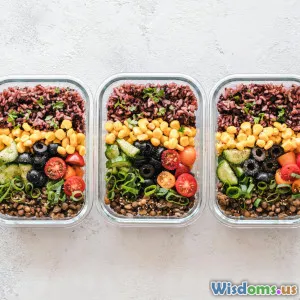
Meal Prep and Mental Wellbeing: Connections Explored
8 min read Explore how meal prepping enhances mental wellbeing through routine, nutrition, and stress reduction. (0 Reviews)
Meal Prep and Mental Wellbeing: Connections Explored
Introduction
Imagine facing a hectic week and feeling prepared, nourished, and calm simply because your meals are ready to go. Amid our fast-paced, often chaotic lives, meal prepping has emerged not only as a powerful tool for healthy eating but also as an unexpected ally in nurturing mental wellbeing. This article dives deeply into how the practice of meal prepping influences mental health beyond physical nourishment, transforming daily routine, reducing stress, and bolstering optimism.
Is meal prepping simply about food, or is it a secret to a more balanced mind? Let’s explore the science, psychology, and real-world practices that reveal the intricate connections between our kitchen habits and emotional wellness.
The Science Behind Food and Brain Health
Before exploring meal prepping, it’s essential to understand why food matters to mental health. The brain relies on nutrients to function optimally; certain vitamins and minerals are critical for neurotransmitter production, energy metabolism, and brain plasticity.
Nutritional Foundations for Mental Health
-
Omega-3 Fatty Acids: Found in fatty fish, flaxseeds, and walnuts, omega-3s support cognitive function and reduce symptoms of depression. A 2015 meta-analysis published in Translational Psychiatry showed omega-3 supplementation decreased depressive symptoms significantly.
-
B Vitamins: Particularly folate, B6, and B12, these are crucial for lowering homocysteine levels linked to mood disorders.
-
Vitamin D: Often dubbed the "sunshine vitamin," low levels correlate with increased depression and anxiety, per studies by the National Institute of Mental Health.
-
Antioxidants: Foods rich in antioxidants, like berries and spinach, combat oxidative stress linked to neurodegenerative diseases and mood instability.
Understanding these facts clarifies why intentional meal planning incorporating these nutrients can improve not only physical but psychological health.
How Meal Prepping Facilitates Mental Wellbeing
Meal prepping involves planning, preparing, and portioning meals ahead of time. This strategy goes beyond convenience. Here are the key mental health benefits.
Establishing Structure and Control
Routine offers stability amid uncertainty. Psychologists emphasize that regular habits reduce cognitive load and anxiety by providing predictability.
Meal prepping naturally creates structure: choosing recipes, shopping lists, cooking schedules — all foster a weekly rhythm. Jennifer Rollin, a clinical dietitian, states, “Eating regular meals at consistent times improves circadian rhythms and mood regulation.”
Reducing Decision Fatigue
The average person makes approximately 35,000 decisions each day. Meal routines cushion decision-related stress by minimizing what to eat daily. Someone practicing meal prep avoids impulsive, often unhealthy food choices, which can deteriorate gut health and mood.
Encouraging Mindful Eating
Meal prepping shifts focus from rushed, distraction-filled eating sessions to conscious eating moments. Mindfulness practices correlate with lower stress and depressive symptoms by enhancing mood-awareness connections.
Promoting Social Connection
Sharing meal prep activities can strengthen bonds. Cooking with family or friends introduces teamwork, joy, and shared responsibility, which are known protective factors against loneliness and depression.
Real-Life Examples and Research Insights
Example 1: The College Student Study
A 2019 survey from the Journal of Nutrition Education and Behavior showed students who regularly meal-prepped reported decreased perceived stress and improved self-efficacy regarding their dietary choices. Students noted that having their meals pre-made helped them manage academic workloads and anxiety.
Example 2: Responding to Workplace Stress
Workers in high-stress environments benefited from meal prep by having ready-to-eat, nutrient-dense lunches. In a 2020 study published in Occupational Medicine, employees practicing meal prep saw improved mood scores and productivity compared to peers relying on fast food.
Expert Opinion
Dr. Emily Roberts, a clinical psychologist specializing in lifestyle medicine, notes, _"Meal prep is more than task management; it's a daily ceremony that nurtures the psyche through agency, nourishment, and anticipatory joy."
Practical Tips for Incorporating Meal Prep for Mental Health
If you’re inspired to start meal prepping to boost mental wellbeing, here are actionable suggestions:
- Start Small: Begin with prepping lunches or snacks for 2-3 days instead of a full week.
- Focus on Balanced Meals: Prioritize proteins, healthy fats, fiber-rich carbs, and diverse vegetables.
- Use Color and Variety: Brightly colored meals with multiple textures can stimulate senses and enhance meal satisfaction.
- Schedule Your Prep: Dedicate fixed times weekly to shop and cook, turning it into a mindful routine.
- Customize and Experiment: Adjust flavors and recipes to keep it enjoyable—not a chore.
- Connect Socially: Invite friends or family to prep meals together or exchange recipes.
Conclusion
Meal prepping encapsulates much more than just the act of cooking ahead. It stitches together nourishment, routine, mindfulness, and social connection — all pivotal ingredients for robust mental wellbeing. Science affirms that what and how we eat profoundly influences brain chemistry, mood, and stress resilience.
By taking control of your eating patterns with meal prep, you craft stability in uncertainty, reduce overwhelm, and nurture your mind through the meals you consume. The next time life’s pace accelerates or your emotional balance falters, remember: your mental health might just have one delicious remedy waiting in the kitchen.
Embrace meal prepping not only as a nutrition hack but as a powerful, accessible practice for a healthier mind and a happier life.
References:
- Martins, D., and Kapczinski, F. (2015). Omega-3 fatty acids and depression: A meta-analysis. Translational Psychiatry.
- Jacka, F.N., et al. (2017). Dietary patterns and mental health: Evidence from psychiatric and general populations. American Journal of Psychiatry.
- National Institute of Mental Health (NIMH) publications on vitamin D and depression.
- Pew Research Center data on decision fatigue and daily choices.
- Journal of Nutrition Education and Behavior (2019). Meal prepping and student stress study.
- Occupational Medicine (2020). Meal prep impact on workplace wellbeing.
Explore your kitchen anew — it might be the most powerful space for cultivating peace within.
Rate the Post
User Reviews
Popular Posts





















